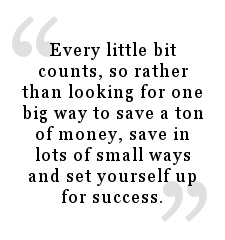Bank Account, Cable, Internet and Cell Phone Fees, Plans & Charges - Part 1: Easy Ways to Clean Up Your Finances this Spring
by Julie Jaggernath
Have you ever been surprised to find a dust bunny lurking in a corner? While it’s easy to clean them up once we spot them, we don’t look into the corners often enough to keep them at bay. The same can be said of our finances, including our fees, plans and charges for bank accounts, cable and internet packages, and cell phone bills.
What areas of your finances could use a little more attention? Where are you spending extra money, and what can you do to clean house, financially speaking?
Here is the first of a 3 part series, highlighting how to clean up three of the services you pay for and cash in on some savings right away. In Part 2, we look at what it costs to pay with plastic (credit cards) and how to save at the grocery store. And then Part 3 shows you how to save with gas prices and what it can cost to store your stuff.
Bank Account Fees - How to Save Money on Common Charges

Choose the right bank account service package for your needs and change packages as your needs change. Then be careful to avoid additional fees, such as:
Cash withdrawals – you know about the fee for using another bank’s ATM, but there’s an added fee for using a convenience cash machine with a private label. A $20 withdrawal can end up costing you an extra $4 - $5 when you add up the ATM fee plus your bank's fee.
Over limit fees – Overdrawing your bank account costs $5, going over your overdraft limit costs more, and going over the limit on your credit card costs around $30. Plan your spending better so that you can stick to your budget and avoid the extra fees and penalties because they really add up.
Returned preauthorized payment fee – Think back to the non-sufficient funds fee (NSF) that was applied to dishonoured cheques. While most people write far less cheques now, a pre-authorized payment from your account is much the same. Many banks now charge as much as $30 - $40 per dishonoured payment, not to mention what the other end may charge for a failed payment. Add these up over the course of a month and you may have enough to gas-up your car, go out for dinner, or pay your cell phone bill.
Communications Bundles - How to Save Money on Phone, Internet & Cable TV Bills

Bundling your home phone, internet, cable and wireless access together might have seemed like a good idea at the time, but when’s the last time your reviewed how you use these services and if your needs have changed?
Once a year it’s time to see what you’re using and what better offers are available. Then make changes to your plans or packages accordingly. By seeing what competitors are offering, you can call the company you’re using and ask them to sharpen their pencil. If you don’t ask, you won’t get.
Many people now prefer to get their news, entertainment, videos and information from the internet. If you’re one of these people, why pay for cable too? Free or low cost TV is available online, e.g. Netflix, and all TV stations stream many shows for free.
Locking into long-term contracts reduces your flexibility if your circumstances change. Look for service providers where you have options to sign up without a contract.
Cell Phones - Ideas for How to Save Money on Plan & Add-On Costs
Review your cell phone statement and your family’s statements to make sure you have the right package, plan or phone.
Pay-as-you-go and pre-paid have many advantages. People who have always been on a plan often don’t think to change over to pre-paid. These plans have more flexibility than ever before and many larger pre-paid amounts don’t expire for a whole year. Base your decision on usage, not on what you’ve always done.
If your kids need a phone, first discuss what they will use it for and who will pay what part of the bill. Then to keep costs down, get a plan based on their usage not yours. Kids text more than talk, so an economical text plan is more important than a cheap phone calling plan.
How to Choose a Cell Phone Plan
These days you might also end up paying for services someone else uses “for you,” so block services you don’t need or want. When someone sends you a premium or multi-media text message you could have to pay extra. Contact your service provider to block receiving and being charged for what you don’t want.
If you don’t need your phone for online access, skip the additional cost. A small browsing package or add-on might seem like just a small fee, but the small packages really just get you to the door of wherever you want to go, virtually speaking. Then you’ll need to pay more to browse and find what you’re actually looking for. With the average webpage today weighing in at 1.3 MB it's easy to burn through your data plan fast and pay more than you planned to. Use Wi-Fi instead and save yourself some cash.
The Bottom Line on Bank Account, Cable, Internet and Cell Phone Fees, Plans & Charges?
Every little bit counts. Rather than looking for one big way to save a ton of money, look at your bank account, cable, internet and cell phone fees, plans, charges and bundles to save in lots of small ways and set yourself up for success.
Related Reading
6-Step Plan to Spring Cleaning and Organizing Your Finances
How Much Money Should You Spend on Living Expenses?
How to Save Money on Household Bills
Your Turn
What tip can you add? Leave your suggestion or comment below.
<< Go back to the Blog main page

Comments
John replied on Permalink
Save on Cable Bills, Cell Phones & Bank Fees, Spring Clean Your
Bobby replied on Permalink
Save on Cable Bills, Cell Phones & Bank Fees
Natasha replied on Permalink
Save on Cable Bills, Cell Phones & Bank Fees, Spring Clean Your
debrap replied on Permalink
Save on Cable Bills, Cell Phones & Bank Fees, Spring Clean Your
Jana replied on Permalink
Save on Cable Bills, Cell Phones & Bank Fees, Spring Clean Your
Dalene replied on Permalink
Save on Cable Bills, Cell Phones & Bank Fees, Spring Clean Your
Brandy replied on Permalink
Save on Cable Bills, Cell Phones & Bank Fees, Spring Clean Your
Gabriele replied on Permalink
Save on Cable Bills, Cell Phones & Bank Fees, Spring Clean Your
Jacklyn replied on Permalink
Save on Cable Bills, Cell Phones & Bank Fees, Spring Clean Your
Ruthie replied on Permalink
Save on Cable Bills, Cell Phones & Bank Fees, Spring Clean Your
Ethel replied on Permalink
Save on Cable Bills, Cell Phones & Bank Fees, Spring Clean Your
Rose replied on Permalink
Save on Cable Bills, Cell Phones & Bank Fees, Spring Clean Your
Terence replied on Permalink
Save on Cable Bills, Cell Phones & Bank Fees, Spring Clean Your
Emilia replied on Permalink
Save on Cable Bills, Cell Phones & Bank Fees, Spring Clean Your
Gwendolyn replied on Permalink
Save on Cable Bills, Cell Phones & Bank Fees, Spring Clean Your
Nelle replied on Permalink
Save on Cable Bills, Cell Phones & Bank Fees, Spring Clean Your
Sima replied on Permalink
Save on Cable Bills, Cell Phones & Bank Fees, Spring Clean Your
Rochelle replied on Permalink
Save on Cable Bills, Cell Phones & Bank Fees, Spring Clean Your
Cassandra replied on Permalink
Save on Cable Bills, Cell Phones & Bank Fees, Spring Clean Your
George replied on Permalink
Save on Cable Bills, Cell Phones & Bank Fees, Spring Clean Your